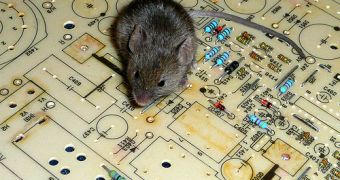On board the space shuttle Discovery which will lift off November 2, the six astronauts will be accompanied by 16 mice, which go to fulfill a historic mission – furnish more data on spaceflight-induced impairment of the human immune system.
For the last 25 years, NASA has been trying to find out why spaceflight decreases the resistance of the human immune system and makes astronauts more vulnerable to infections caused by bacteria or viruses.
This mouse experiment is a joint project of the University of Texas Medical Branch at Galveston and NASA's Ames Research Center in Mountain View, California, and it represents the final immunology research of the shuttle program.
Dr. Roberto Garofalo, a professor at UTMB Health and principal investigator for the project, explained that “since the Apollo missions, we have had evidence that astronauts have increased susceptibility to infections during flight and immediately post-flight — they seem more vulnerable to cold and flu viruses and urinary tract infections, and viruses like Epstein-Barr, which infect most people and then remain dormant, can reactivate under the stress of spaceflight.”
“We want to discover what triggers this increased susceptibility to infection, with the goal both of protecting the astronauts themselves and people with more vulnerable immune systems here on Earth, such as the elderly and young children.”
The 'astromice' will be riding in a special container that will supply food and water automatically.
They will be in orbit for 11 days, during which the astronauts will perform daily health and well-being checks.
Two hours after the mice return to Earth, eight of them will be infected with respiratory syncytial virus, which infects nearly all children by age two and usually causes a relatively harmless cold-like upper respiratory disease.
In some cases though, the infection can spread to the lungs and cause coughing, wheezing and serious breathing difficulties.
The researchers will also expose to the virus another group of mice kept in almost identical conditions on the ground, and genetic and protein studies of the lung and nasal tissues of both sets of mice, evaluation of lung inflammation, viral replication and other key factors related to RSV infection in mice, will hopefully reveal why the immune system weakens in space.
Garofalo said that there is “substantial experience using mice to study immune response to RSV infection, and that will enable us to look at all the aspects of the immune responses of these mice as well as the pathological manifestations of the disease, looking at ways in which the space environment affects this respiratory infection.”
Understanding how spaceflight affects the immune system is very important, especially that NASA plans human expeditions on other planets or on asteroids, far beyond the relatively safety of Earth's orbit.
Also, the developing commercial spaceflight industry hopes to launch private citizens into orbit, so they need to make sure that passengers will stay healthy and safe.

 14 DAY TRIAL //
14 DAY TRIAL //